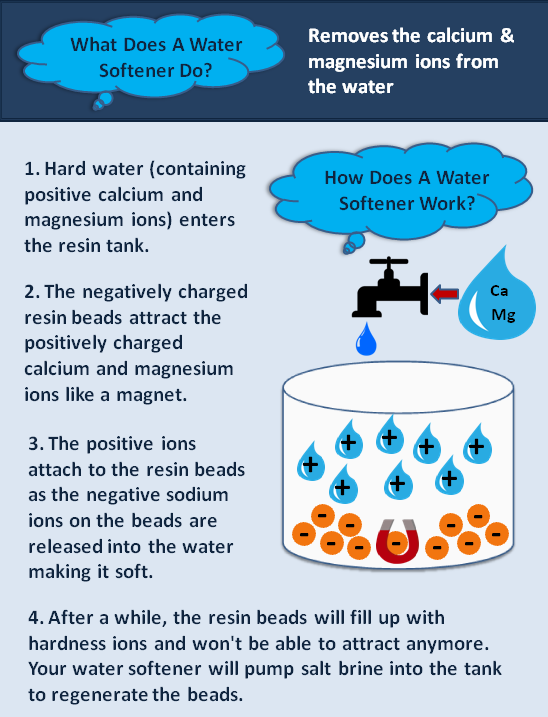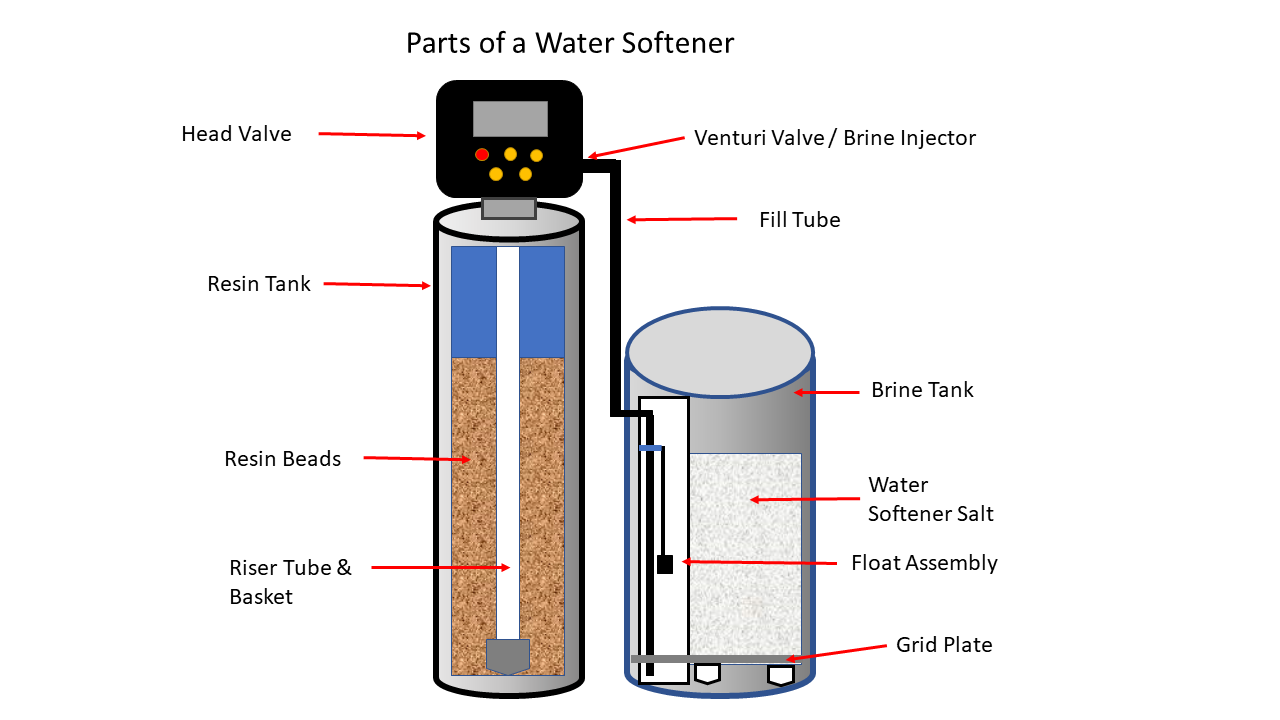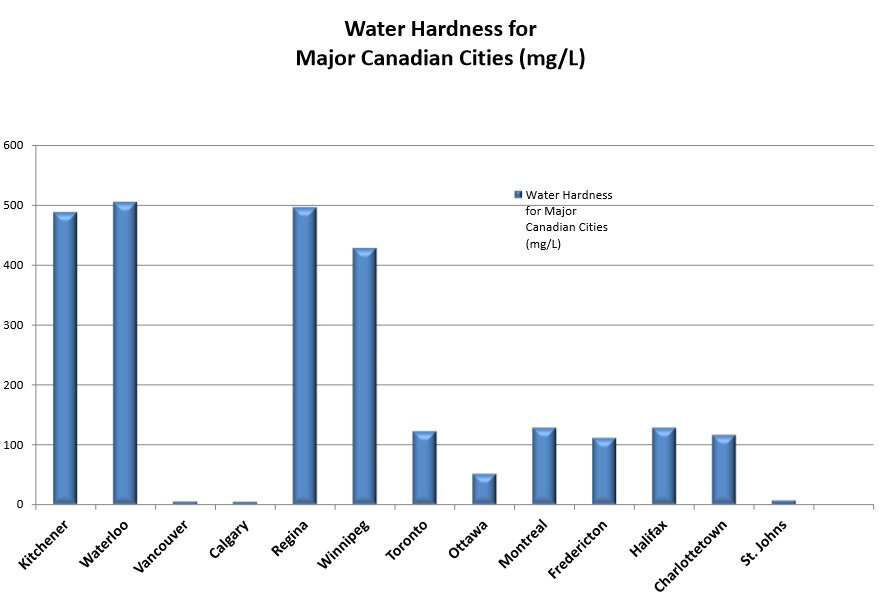Ever wondered “how does a water softener work?” We’re experts in this area and we’re here to help. We’ll start by answering that question and then jump to some information on hard vs. soft water and the benefits of a water softener.
1. How Does a Water Softener Work?
4. Benefits of a Water Softener.
If you need a new water softener, contact us today!
How does a water softener work?
1. The Water Softening Process
A water softener exchanges "ions" of sodium and potassium with calcium and magnesium.
This occurs in four steps:
Step 1: The water in your house runs through a resin bed of small plastic beads. The beads are covered with sodium or potassium ions (hence the need for water softener salt). As the water flows past the ions, they swap places with the calcium and magnesium ions. Eventually, the beads contain nothing but calcium and magnesium, and softening stops. It is then time to regenerate the beads.
Step 2: To regenerate, the beads need to regain their sodium or potassium ions by being flooded with a salty, brine solution that is rich in sodium or potassium.
Step 3: Once completed, the calcium, magnesium, dirt and sediments are flushed from the beads and into the drain in a process called backwash.
Step 4: The final phase rinses the mineral tank with fresh water and loads the brine tank so it's ready for the next cycle.
There are two types of regeneration cycles:
AUTOMATIC
All functions are performed automatically, including regeneration.
TIME-CLOCK
Regenerates on a pre-set schedule.
Both types of softeners come in a single or twin tank style.
2. Water softener maintenance
How does a water softener work well? Water softeners require little maintenance, and will usually last between 10-15 years! However, that doesn’t mean you should just forget about your unit.
Here are some maintenance tips that will help keep your softener running well for longer:
Use high-quality salt - Cheaper salt options such as rock salt may have more impurities and can cause significant mineral build-up.
Purchase a new bag approximately once a month - As ion exchange occurs, the salt gets used up (unlike the beads which remain in your tank). The exact timing for salt replacement will depend on the size of your family and your personal water usage.
Don’t add too much salt - Only refill your salt when needed, and don’t add too much (don’t go over 2/3 full).
Clean the brine tank - This doesn’t need to happen very often, but it is recommended that you do it about once per year.
Check your softener frequently - Even if you think everything is running smoothly, check on your softener and inspect for leaks and mineral build-up. Catch small problems before they become big ones!
Trying to fix a problem with your water softener can make it worse and end up costing you more money in the long term.
If you see or experience the following issues, it’s time to call for a repair:
Salt bridges are forming in your tank
You notice leaking around your unit
Your water is no longer soft
Excessive water is building up in your salt tank
There’s no power in your unit
Your motor is broken
Your timer is not working properly
At WaterSmart, we have experience dealing with all of these problems and more.
Here’s all the parts that help a water softener work
3. Hard vs. soft water
Why does water need to be softened, anyways? What is hard water?
Water hardness is usually determined by how much calcium and magnesium are found within your home’s water.
Check out the chart below to see how water hardness varies in different cities across Canada.
As you can see, hard water levels differ by area. That’s due to the sources of your drinking water.
In some areas, groundwater simply contains more minerals than what is found in other areas.
Located on the Grand River watershed, Kitchener and Waterloo have some of the hardest water found in all of Canada! That means that if you do not have a water softener, you may experience some of the negative effects we will discuss below.
4. Benefits of a water softener
How does a water softener work towards improving your home’s water situation?
There are numerous benefits to having a water softener. Here are a few of the big ones:
BETTER FOR YOUR PIPES AND APPLIANCES
All the hard minerals and chemicals in the water build up in your pipes and appliances over time.
This scale buildup can be really hard on your plumbing system and appliances like your coffee maker and dishwasher, causing you to replace them sooner than expected.
HEALTHIER AND SOFTER SKIN
The minerals in hard water remove your skin’s natural oils, which can dry out your skin and, for some, result in itchy, irritated skin.
Therefore, you might feel the need to use lots of moisturizers to overcome the hard minerals.
A water softener benefits your skin, keeping it looking healthy and feeling soft.
When your water softens, harmful chemicals and minerals are removed, making the water more suitable for your skin.
KEEPS YOUR CLOTHES LOOKING FRESH
A study by Purdue University found that clothes washed in hard water wear out 15 percent faster than clothing washed in soft water.
The calcium minerals bond with the soap to create a detergent clump that sticks to the fabric, drawing in more dirt than before you washed your clothes.
Over time, detergent residue can turn your white clothes gray or yellow, and you may even discover white or gray streaks on your coloured clothes.
This buildup is what makes laundry feel stiff and crusty.
When this happens, the fabric is less likely to flex, creating more friction and causing unnecessary wear and tear on your laundry.
A water softener will have a similar effect on your dishes.
SAVES YOU MONEY!
Softer water saves you money when it comes to repairs on plumbing and appliances. Buildup can be very hard on your pipes, and you might have leaks that develop along the way.
Appliances that use hot water such as your dishwasher, electric kettle, and washing machine will also develop mineral build-up which will reduce their overall effectiveness and lifespan.
Water softeners will also save money on your energy bill, as well as restocks of moisturizers, shampoo, soap, and water filters.
The calcium from the hard water will also build up in your hot water tank. Since calcium is not a heat conductor, the build-up will cause your water tank to create more heat, using more energy than needed.
SAVE ON ENERGY AND WATER BILLS WITH A WATER SOFTENER
Trust WaterSmart for All Your Water Softener Needs!
If you need water softener installation in the Kitchener-Waterloo region, you can trust WaterSmart.
We'd be happy to help at a reasonable rate, and we even have financing options to get you started.
Our expert, experienced plumbers will install your new water softener efficiently and at a price that you can afford.
If you purchase a water softener from us, your installation is free!
Contact WaterSmart today for a free quote.
“The installer did a great job he relocated the softener to make it easier to fill the salt tank . On time and great service !!! 👍”





